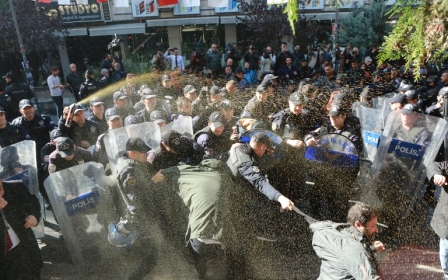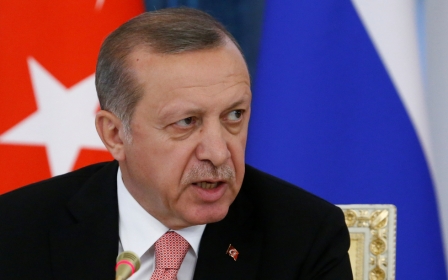ANALYSIS: The end of democracy in Turkey?

ISTANBUL, Turkey – The arrest of the leadership of Turkey's largest pro-Kurd party presents the country with not only a democratic deficit but an increased threat to its security, analysts have warned.
The HDP, or People's Democracy Party, on Friday said Turkey was witnessing the "death of democracy" after its co-leaders and sitting MPs were formally arrested for failing to appear voluntarily before a court to answer questions in an ongoing "terrorism probe".
Party members lost their parliamentary immunity in May after the ruling AKP party, led by President Recep Tayyip Erdogan, said it would seek to prosecute anyone suspected of links to the Kurdish insurgency led by the PKK, or Kurdistan Workers' Party.
That allowed for the arrest of 12 MPs from the HDP, including co-leaders Selahattin Demirtas and Figen Yuksekdag on Friday.
Mustafa Akyol, a political analyst and author of the book Islam without Extremes: A Case for Muslim Liberty, told Middle East Eye that with the latest moves, Turkey is now at "the zenith of illiberal democracy".
"I put it like this because if you ask President Erdogan and his supporters they will tell you that all these actions actually consolidate democracy,” said Akyol.
The AKP introduced the motion to strip MPs of parliamentary immunity to target individual MPs instead of attempting to shut down the entire party, he said.
“This is just another method of attaining the same goal,” said Akyol.
The AKP government says the MPs from the Peoples’ Democratic Party (HDP) represent the political wing of the PKK, and that they should answer for illegal actions supporting terrorist groups regardless of whether they are elected representatives.
The HDP’s refusal to ever openly condemn PKK attacks has created a gray area, allowing such prosecutions under existing terrorism laws.
The failed coup attempt on 15 July has accelerated the AKP's moves against what it sees as enemies of the state, arresting tens of thousands of people in the name of national security.
“The AKP has faced challenges and the coup attempt was the biggest one," said Akyol. "They now respond to everything with anger and resentfulness. This is their default mode.”
“Erdogan and his team have changed their view on the Kurdish approach many times. Their current approach is reverting to the old state idea that absolute force is the solution.”
More than 100 media outlets have been shut since the coup attempt while more than 100,000 state employees have been sacked.
Critics also say the AKP’s simple view of democracy - whoever wins at the ballot box is free to do as they please - has sent the country spiralling from democracy toward becoming an authoritarian state.
However Vahap Coskun, from the law faculty at Diyarbakir’s Dicle University, said that for all the warnings of a growing and powerful authoritarian state, in his view Turkey had never been fully democratic.
In the case of the HDP, Coskun said the government had chosen the easy but wrong approach but that the HDP needed to take some responsibility for the current situation as well.
“The government decided on a military approach toward the PKK and also to eliminate what it felt was the movement’s political existence in the shape of the HDP," he said.
"This is the easy approach but it has never succeeded before. It only makes matters worse in the longer term when political space is narrowed."
Indeed, the honorary president of the HDP, Ertugrul Kurkcu, told Middle East Eye that a "basic rule of politics" is that "violence invites violence".
But Coskun said that the HDP had in many ways brought such heat upon itself.
“To be honest the HDP could never have done and wasn’t ever capable of behaving toward the PKK in the manner the government desired," he said.
"But it could have done much better when it came to issues - such as the setting up of barricades in south-eastern towns and cities when urban conflict raged after July 2015."
That only reinforced the AKP's view that the HDP was part of the problem, rather than part of the solution.
Coskun said Turkey, for all its turmoil, has in recent years "embarked on a path of democratisation".
Perhaps for the first time in Turkey's history, individual rights were being put before those of the state. The Turkish economy was punching above its weight. International visitors were coming in record numbers. A climate of optimism prevailed.
Prior to the coup and the subsequent crackdown, Turkey was being held up as a shining example for other countries in need of inspiration. It was knocking on the EU’s door to gain membership in that exclusive club.
The major driving force behind this phenomenal rise was, indeed, the AKP. It brought a fresh impetus to a jaded political sphere when it came to power in 2002.
The EU was considered the villain of the piece in Turkey by dragging its feet and the perception that it didn’t want Muslim Turkey in the Christian club.
But the flaring of the war with the PKK and the coup has made the AKP government retrench.
Is it the end of democracy, as the HDP says? Coksun does not concur: "Of course targeting the HDP in this manner and the stifling of the press create major obstacles on this path but it doesn’t mean that it is over for good."
This article is available in French on Middle East Eye French edition.
Stay informed with MEE's newsletters
Sign up to get the latest alerts, insights and analysis, starting with Turkey Unpacked
Middle East Eye delivers independent and unrivalled coverage and analysis of the Middle East, North Africa and beyond. To learn more about republishing this content and the associated fees, please fill out this form. More about MEE can be found here.




